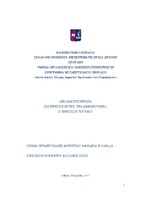Εσωτερικός έλεγχος στο δημόσιο τομέα: η περίπτωση του ΕΦΚΑ

View/
Keywords
Ελεγκτική (Λογιστική) ; Εσωτερικός έλεγχος ; Δημόσιος τομέας ; Έρευνα ; Ενιαίος Φορέας Κοινωνικής Ασφάλισης (Ε.Φ.Κ.Α.)Abstract
As of 2008 Greece is facing a severe a prolonged financial crisis. The 1st
MoU in May 2010 lead to a steep economic adjustment of our economy and also
made it imperative to implement a long-term plan to restructure the Greek economy,
part of which is the modernization of the Public Administration.
As a result, a major effort has been made in recent years to adopt an
integrated institutional framework of standards and principles under which Public
Administrations should operate in order to avoid corruption and mismanagement in
public money. The effort to establish an internal control framework under which
Greek State should regulate in order to comply with European public governance
standards follows the official international practices as described in the Institute of
Internal Auditor's Manual. The first results show a positive sign in dealing with
corruption cases. Internal control (strengthen from internal control systems)
improves risk management, human resources utilization, regulatory compliance and
governance in an economical and cost-effective manner.
Under law 4387/2016 EFKA was created. Under EFKA all former main
public pension funds were merged. EFKA will be an economic unit, complex in
terms of subject, with a variety of specialized operating segments, whose work will
be developed in several decentralized areas and will employ a large number of
employees. Therefore, an internal system control will ensure the implementation of
the Management's objectives and decisions.
Up to the drafting of this work, EFKA had not adopt an organizational chart
and in conjunction with the transition period under which will operate initially the
weaknesses, errors and omissions that have been "inherited" in the newly established
body are highlighted. It is vital to address these issues in order to achieve balance
between the economic viability and the adequacy of the social protection of our
country's social security system. Given the timing of the EFKA creation, the conclusions drawn from this
work could be taken into account for the adoption and development of a proper
internal control system for "shielding" EFKA and therefore achieving its mission. The success of requires change of culture and also review/change of the current
situation.
This work aims in identifying the need for internal control and its systems, as
it is perceived in employees' consciousness. It presents the current situation in EFKA
as regards the organizational / administrative structure and internal audit.
The main conclusions for this research are summarized below:
For former public pension funds, the lack of financial statements, the failure to
keep assets registry (as a result of the inadequacy of the accounting system), the
existence of cases of mismanagement, the absence of job descriptions and tasks
and the overlapping of responsibilities are the main dysfunctional factors that
highlight the inefficiency of internal control systems.
Generally, internal control is minimal, although the participants consider it to be
very important. The situation was similar to the former public pension funds
which also lacked a well-organized and clearly defined internal control system
and a relevant department to assess the adequacy, effectiveness and efficiency of
the internal control system.
Although EFKA has mechanisms of financial and administrative control, as well
as regulatory compliance mechanisms, they are inadequate. The precarious management of the survival of the Greek Public Pension System,
before and after the merger of Public Pension Funds into a single entity,
essentially minimizes the setting of strategic objectives, and planning at all levels
of administration. More generally, for Public Administration, it is imperative, especially in the
current period of the ongoing economic crisis, to operate within a sound
framework of rational and good governance. The political system of the past
decades has accepted a system of customer relations in the country's governance
by not taking measures to restore the competitiveness of the economy. It
established the practice of high budget deficits, tolerance of delinquency and
wastage of public money, concealing the real facts.


